22 dec 2018
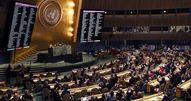
The United Nations General Assembly adopted, by an overwhelming majority, a resolution that affirms the right of the Palestinian people to sovereignty over their natural resources.
The resolution was adopted by a recorded vote of 159 in favour to 7 against (Canada, Israel, Kiribati, Marshall Islands, Micronesia, Nauru, United States), with 13 abstentions.
The resolution stresses permanent sovereignty of the Palestinian people in the occupied Palestinian territory, including East Jerusalem, and of the Arab population in the occupied Syrian Golan over their natural resources.
By that text, the Assembly demanded that Israel cease the exploitation, damage, cause of loss or depletion and endangerment of the natural resources in the occupied Palestinian territory, including East Jerusalem, and in the occupied Syrian Golan.
By further terms, the Assembly stressed that the wall and settlements being constructed by Israel in the occupied Palestinian territory are contrary to international law and are seriously depriving the Palestinian people of their natural resources.
The resolution was adopted by a recorded vote of 159 in favour to 7 against (Canada, Israel, Kiribati, Marshall Islands, Micronesia, Nauru, United States), with 13 abstentions.
The resolution stresses permanent sovereignty of the Palestinian people in the occupied Palestinian territory, including East Jerusalem, and of the Arab population in the occupied Syrian Golan over their natural resources.
By that text, the Assembly demanded that Israel cease the exploitation, damage, cause of loss or depletion and endangerment of the natural resources in the occupied Palestinian territory, including East Jerusalem, and in the occupied Syrian Golan.
By further terms, the Assembly stressed that the wall and settlements being constructed by Israel in the occupied Palestinian territory are contrary to international law and are seriously depriving the Palestinian people of their natural resources.
11 dec 2018
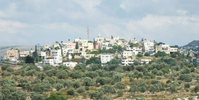
Thousands of Palestinian households, in the north of the West Bank, have been without running water for two weeks, now, due to Israel’s procrastination in fixing a water pumping station, a local official said on Monday.
Omar Yamin, head of Jitt village council, east of the northern West Bank city of Qalqilia, told WAFA that the main water station in Beit Iba, which provides drinking water to four villages in that area, has been down for two weeks and the Israeli authorities responsible for it have been procrastinating in fixing it.
He said that 20,000 people in these villages have been relying on buying water from water tanks, which is expensive and lacks health standards, for their daily use.
Yamin said that local authorities have been in contact with the Palestinian Authority, to intervene with Israel, to fix the station.
Omar Yamin, head of Jitt village council, east of the northern West Bank city of Qalqilia, told WAFA that the main water station in Beit Iba, which provides drinking water to four villages in that area, has been down for two weeks and the Israeli authorities responsible for it have been procrastinating in fixing it.
He said that 20,000 people in these villages have been relying on buying water from water tanks, which is expensive and lacks health standards, for their daily use.
Yamin said that local authorities have been in contact with the Palestinian Authority, to intervene with Israel, to fix the station.
8 dec 2018
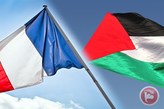
Palestine and France signed 10 cooperation agreements, on Friday, during a visit by Palestinian Prime Minister Rami Hamdallah to Paris and his meeting with his French counterpart, Edouard Philippe.
Palestinian Foreign Minister Riyad al-Malki, along with his French counterpart, Jean-Yves Le Drian, signed 10 cooperation agreements in education, budget, local governance, civil defense, environment, water, agriculture and developing the private sector.
Meanwhile, Hamdallah attended a joint press conference with Philippe, where he thanked France for its support for Palestine and its support for the two-state solution.
Hamdallah said, "As I expressed in our discussions with Prime Minister Philippe today, we are grateful for the French positions which demonstrate strong commitments to deepen and develop our partnership and cooperation and I would like to emphasize that this is also our commitment.”
He said that the meeting of the joint French-Palestinian ministerial committee in Paris is important for promoting cooperation between their two countries and its peoples.
Hamdallah said that French support was vital for developing the Palestinian economy and strengthening government institutions through capacity building, particularly in areas such as health, education, agricultural and water, among others.
“Our meeting today in Paris is a strong demonstration of the solidarity between the French and Palestinian peoples, as well as the tremendous opportunities for cooperation between us.”
Regarding the peace process, Hamdallah appreciated French efforts to bring peace to the Middle East and called for establishing an international group to revive the deadlocked peace process.
Hamdallah added, "I would like to emphasize the utmost importance of recognizing the independent Palestinian state on the 1967 borders with East Jerusalem as its capital. This recognition will help save the two-state solution and give hope and optimism to our Palestinian people.”
Palestinian Foreign Minister Riyad al-Malki, along with his French counterpart, Jean-Yves Le Drian, signed 10 cooperation agreements in education, budget, local governance, civil defense, environment, water, agriculture and developing the private sector.
Meanwhile, Hamdallah attended a joint press conference with Philippe, where he thanked France for its support for Palestine and its support for the two-state solution.
Hamdallah said, "As I expressed in our discussions with Prime Minister Philippe today, we are grateful for the French positions which demonstrate strong commitments to deepen and develop our partnership and cooperation and I would like to emphasize that this is also our commitment.”
He said that the meeting of the joint French-Palestinian ministerial committee in Paris is important for promoting cooperation between their two countries and its peoples.
Hamdallah said that French support was vital for developing the Palestinian economy and strengthening government institutions through capacity building, particularly in areas such as health, education, agricultural and water, among others.
“Our meeting today in Paris is a strong demonstration of the solidarity between the French and Palestinian peoples, as well as the tremendous opportunities for cooperation between us.”
Regarding the peace process, Hamdallah appreciated French efforts to bring peace to the Middle East and called for establishing an international group to revive the deadlocked peace process.
Hamdallah added, "I would like to emphasize the utmost importance of recognizing the independent Palestinian state on the 1967 borders with East Jerusalem as its capital. This recognition will help save the two-state solution and give hope and optimism to our Palestinian people.”
7 dec 2018
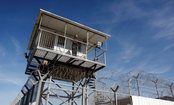
An Israeli military court approved the removal of the water supply network in Aqaba village in the northern Jordan Valley and turned down an objection filed a year ago by the local residents.
Chief of the village Sami Sadeq told a reporter for the Palestinian Information Center (PIC) that a lawyer hired by the residents told them that the Israeli court rejected the objection filed against the removal of the water network and sanctioned the Israeli occupation army’s decision to raze it at the pretext that it was set up with no license.
Sadeq said that the water network was deployed about two years ago in the village to serve the local residents, but later the Israeli army ordered its removal, adding that the case had been dealt with by an Israeli military court for about one year.
The local official affirmed that the village council and the residents would not give up and would try to extract a verdict against the removal of the water network from the Israeli high court of justice.
The water supply network is an internal system inside the village serving about 70 Palestinian homes.
The village of Aqaba is encircled by three Israeli army bases and its residents are exposed to repeated shooting incidents during military drills and exercises.
The Israeli army has already demolished several homes in the village and threaten to raze more others as well as its Mosque.
Chief of the village Sami Sadeq told a reporter for the Palestinian Information Center (PIC) that a lawyer hired by the residents told them that the Israeli court rejected the objection filed against the removal of the water network and sanctioned the Israeli occupation army’s decision to raze it at the pretext that it was set up with no license.
Sadeq said that the water network was deployed about two years ago in the village to serve the local residents, but later the Israeli army ordered its removal, adding that the case had been dealt with by an Israeli military court for about one year.
The local official affirmed that the village council and the residents would not give up and would try to extract a verdict against the removal of the water network from the Israeli high court of justice.
The water supply network is an internal system inside the village serving about 70 Palestinian homes.
The village of Aqaba is encircled by three Israeli army bases and its residents are exposed to repeated shooting incidents during military drills and exercises.
The Israeli army has already demolished several homes in the village and threaten to raze more others as well as its Mosque.
3 dec 2018
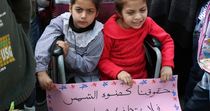
At the entrances of Nablus governorate to the north-west, the towns of Deir Sharaf, Barqa and Bazaria, suffer from the scarcity of water, despite the fact that they live on a large water basin, while the nearby settlement of Shavei Shomron enjoys large amounts of water round the clock.
The residents of these towns, which number more than 40,000, are distressed and thirsty, while 1,200 settlers consume water twice as much they do.
Palestinians’ plantations die because of the lack of water in the summer, and the trees of Shavei Shomron settlement rise up in the sky due to abundant amounts of water.
Water guaranteed for settlers
Dirar Abu Omar, the Director of the Agricultural Relief Society in Nablus and the former deputy mayor of Barqa village for four years, said that the Israelis control the water basin in the settlement of Shomron, which gets its water from the water-well of the Palestinian neighboring village of Beit Iba. When the water level goes down to less than two meters, settlers get water around the clock.
He added that anyone observing the trees inside the Israeli military post and the settlement of Shomron, could see the size of the trees, which are no more than ten years old. The trees of the villages of Naqoura and Deir Sharaf, which are 60 years old, do not reach half of their size due to the lack of water.
The suffering in summer
The head of the council of Deir Sharaf village, Fahmi Nofal, confirms that only a street separates his town from the Israeli settlement. In the summer, the town suffers from lack of drinking water, and people are forced to buy water through tanks or to bring water from a water spring in the town.
Farmer Abdullah Antari says that dozens of dunums planted with citrus have dried up or decreased their produce due to the lack of water, after the village was known for orange and lemon produce, which was profitable for farmers, pointing out that one of the workers from the town at the settlement of Shomron has noticed the existence of swimming pools in the majority of the houses of the settlement, as well as pipes for watering plantations around the clock.
According to Mahmoud Saifi, the Director of the Land Research Center in Nablus, the Israeli occupation controls the Palestinian resources, including water, as well as the drilling of water-wells and the quantities of water allowed to be pumped, based on the Oslo Accords, without heeding the needs of the citizens for drinking water and for irrigating crops.
Israeli control
He added that the villages north-west of Nablus is an example of this, despite the presence of plenty of water under their land, and the passage of water lines in front of their homes.
According to the Palestinian Central Bureau of Statistics, the Israeli occupation controls 85% of the water flowing from the aquifers, forcing the Palestinians to purchase water from the Israeli water company Mekorot; the amount of water purchased amounted to 63.5 million m3.
The Israeli occupation also controls most of the renewable water resources in Palestine, amounting to about 750 million m3 annually, while the Palestinians receive only about 110 million m3 of the available resources.
The Palestinian share of the aquifers according to the Oslo Accords is 118 million m3. This quantity was supposed to become 200 million m3 by the year 2000, if the Oslo Accords were implemented.
According to Engineer Mazen Ghoneim, the Head of the Water Authority in Palestine, the daily ration of water of Israeli settlers is from 400 to 800 liters, compared to 45-50 liters for the Palestinians.
The residents of these towns, which number more than 40,000, are distressed and thirsty, while 1,200 settlers consume water twice as much they do.
Palestinians’ plantations die because of the lack of water in the summer, and the trees of Shavei Shomron settlement rise up in the sky due to abundant amounts of water.
Water guaranteed for settlers
Dirar Abu Omar, the Director of the Agricultural Relief Society in Nablus and the former deputy mayor of Barqa village for four years, said that the Israelis control the water basin in the settlement of Shomron, which gets its water from the water-well of the Palestinian neighboring village of Beit Iba. When the water level goes down to less than two meters, settlers get water around the clock.
He added that anyone observing the trees inside the Israeli military post and the settlement of Shomron, could see the size of the trees, which are no more than ten years old. The trees of the villages of Naqoura and Deir Sharaf, which are 60 years old, do not reach half of their size due to the lack of water.
The suffering in summer
The head of the council of Deir Sharaf village, Fahmi Nofal, confirms that only a street separates his town from the Israeli settlement. In the summer, the town suffers from lack of drinking water, and people are forced to buy water through tanks or to bring water from a water spring in the town.
Farmer Abdullah Antari says that dozens of dunums planted with citrus have dried up or decreased their produce due to the lack of water, after the village was known for orange and lemon produce, which was profitable for farmers, pointing out that one of the workers from the town at the settlement of Shomron has noticed the existence of swimming pools in the majority of the houses of the settlement, as well as pipes for watering plantations around the clock.
According to Mahmoud Saifi, the Director of the Land Research Center in Nablus, the Israeli occupation controls the Palestinian resources, including water, as well as the drilling of water-wells and the quantities of water allowed to be pumped, based on the Oslo Accords, without heeding the needs of the citizens for drinking water and for irrigating crops.
Israeli control
He added that the villages north-west of Nablus is an example of this, despite the presence of plenty of water under their land, and the passage of water lines in front of their homes.
According to the Palestinian Central Bureau of Statistics, the Israeli occupation controls 85% of the water flowing from the aquifers, forcing the Palestinians to purchase water from the Israeli water company Mekorot; the amount of water purchased amounted to 63.5 million m3.
The Israeli occupation also controls most of the renewable water resources in Palestine, amounting to about 750 million m3 annually, while the Palestinians receive only about 110 million m3 of the available resources.
The Palestinian share of the aquifers according to the Oslo Accords is 118 million m3. This quantity was supposed to become 200 million m3 by the year 2000, if the Oslo Accords were implemented.
According to Engineer Mazen Ghoneim, the Head of the Water Authority in Palestine, the daily ration of water of Israeli settlers is from 400 to 800 liters, compared to 45-50 liters for the Palestinians.
